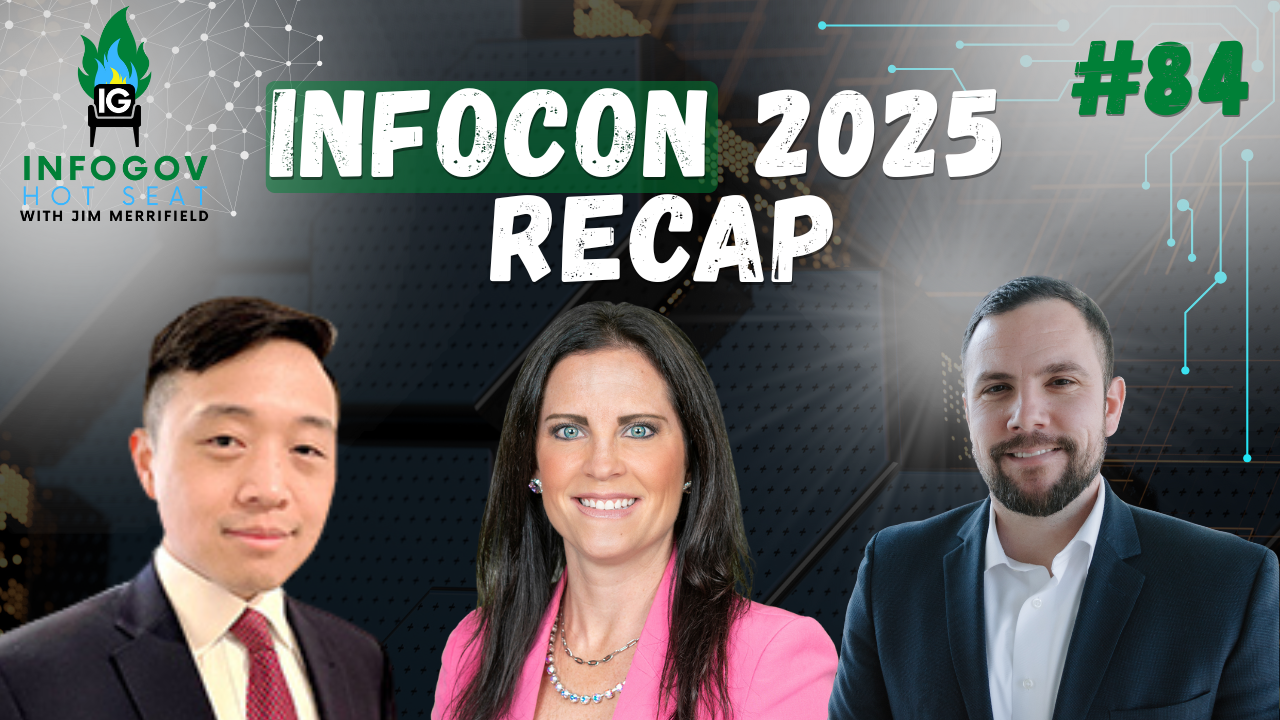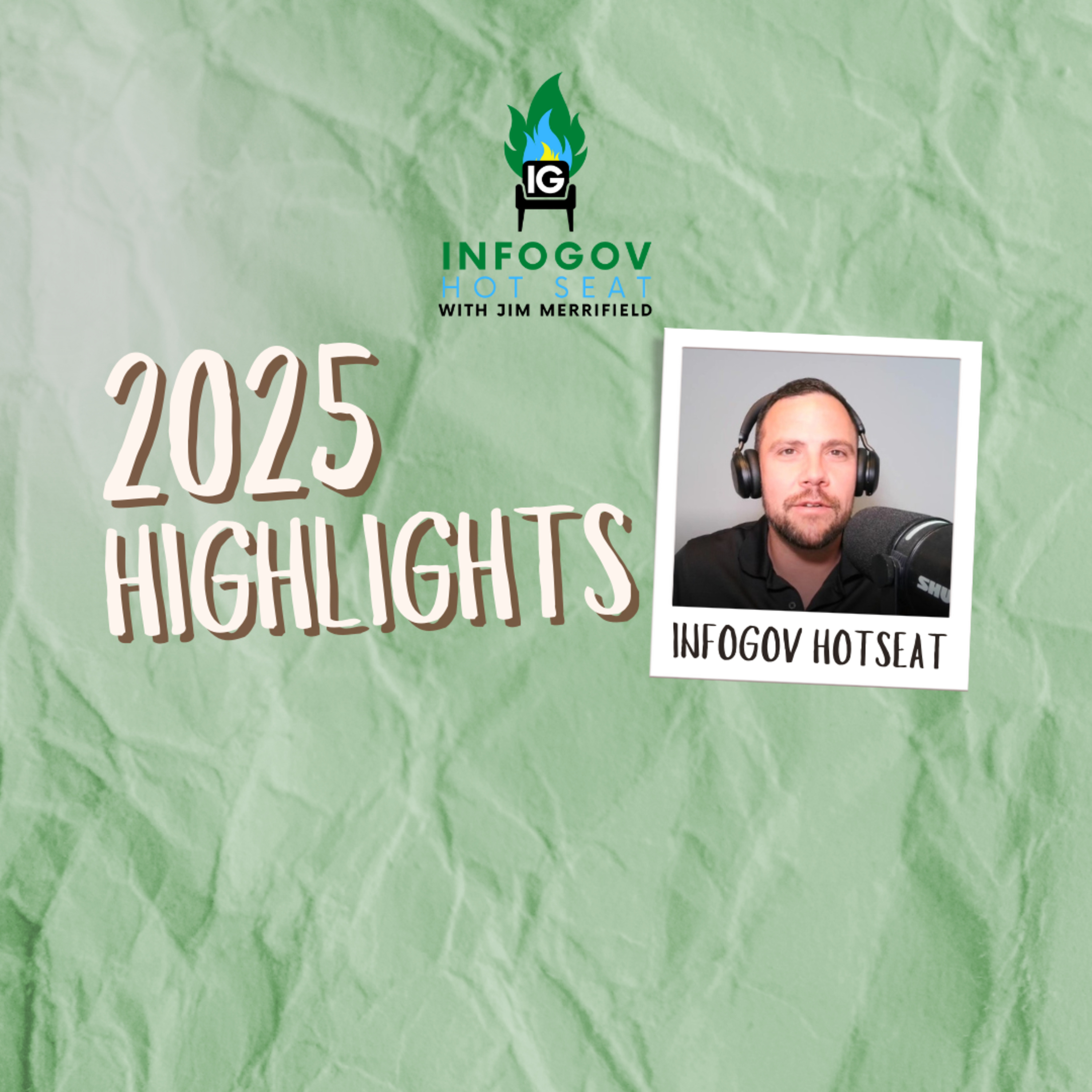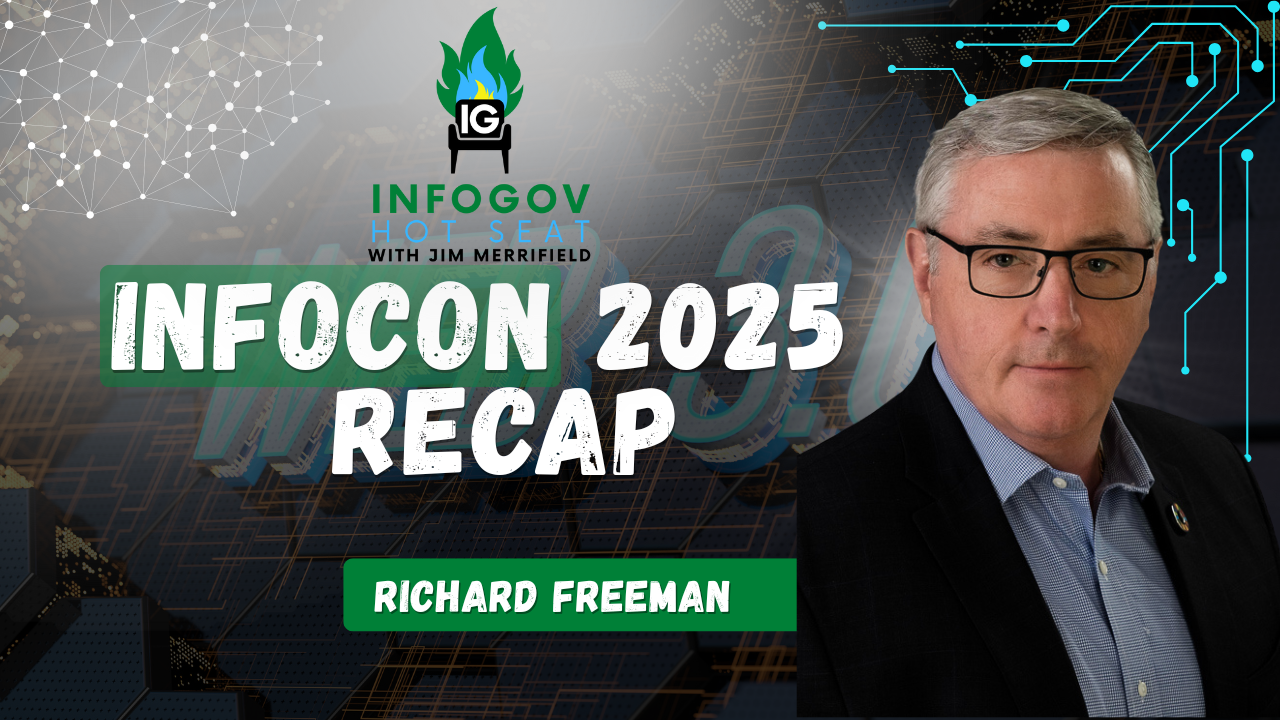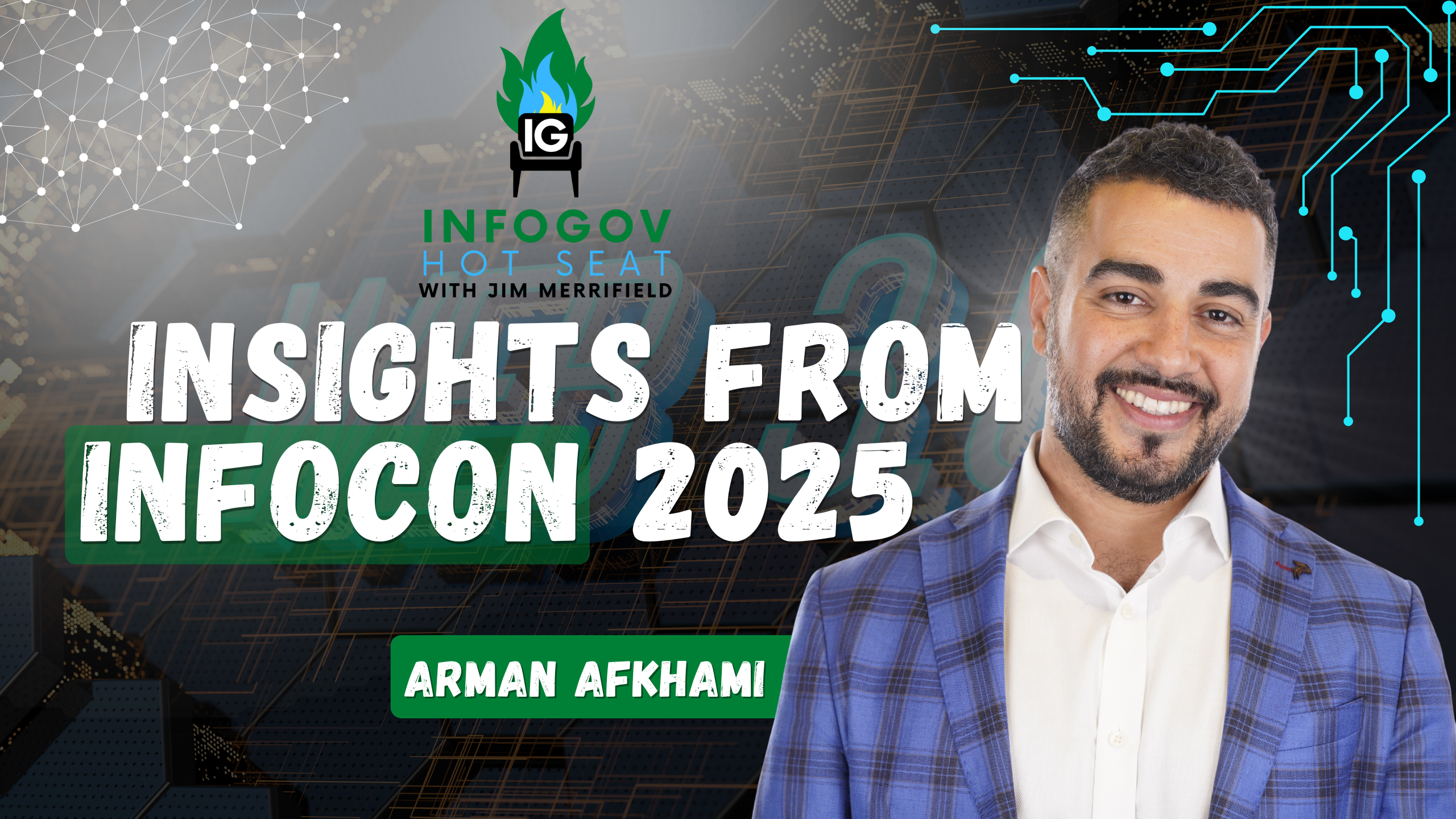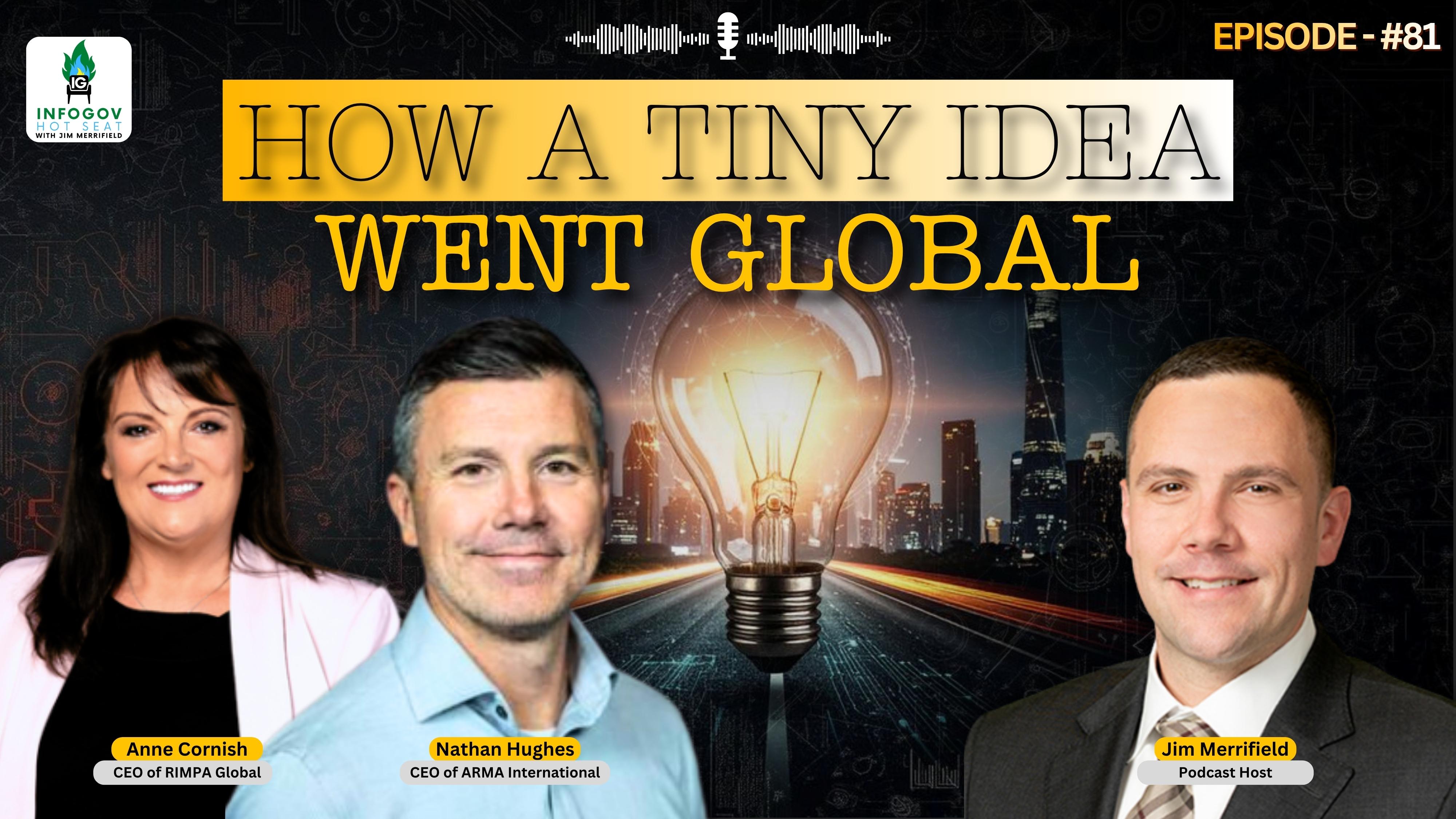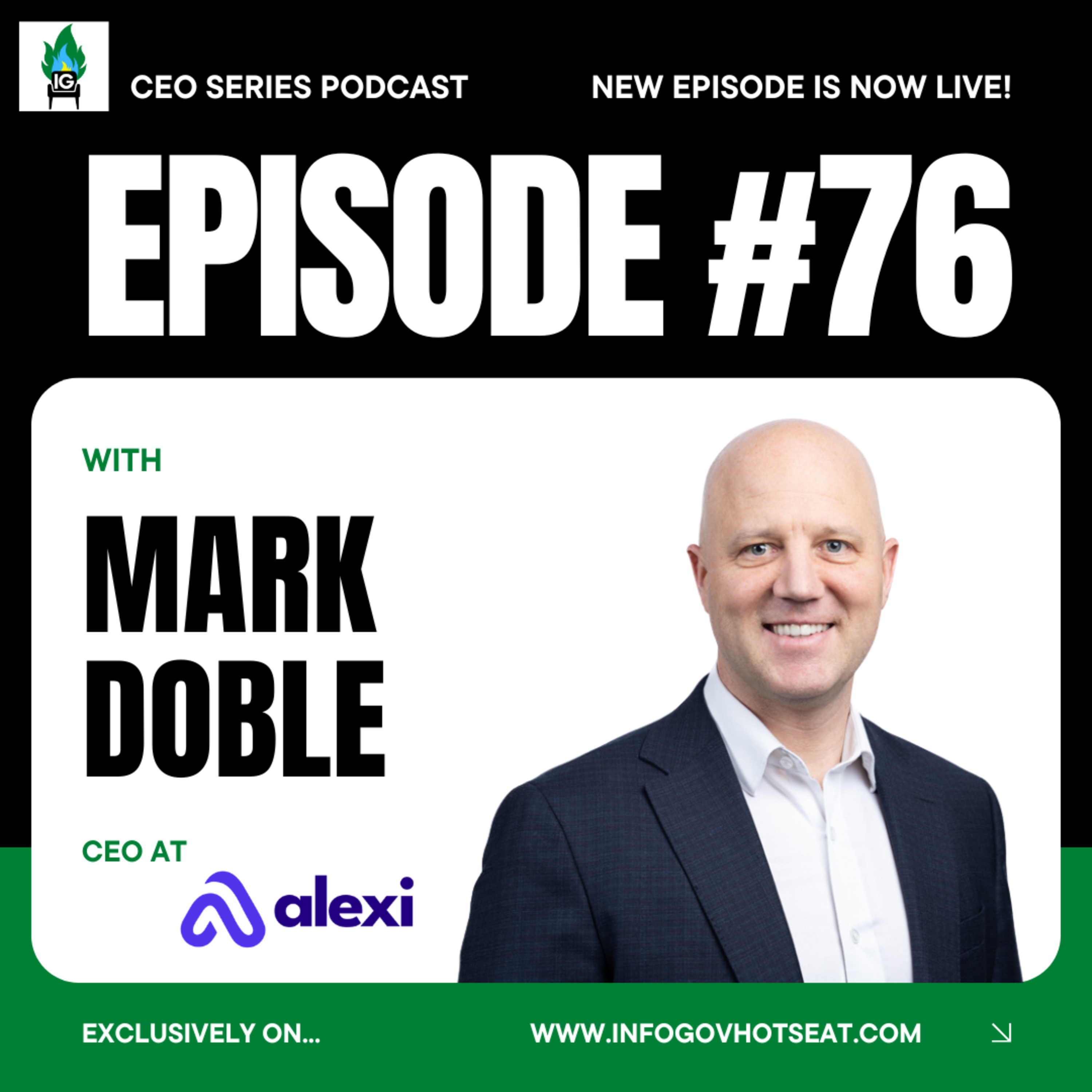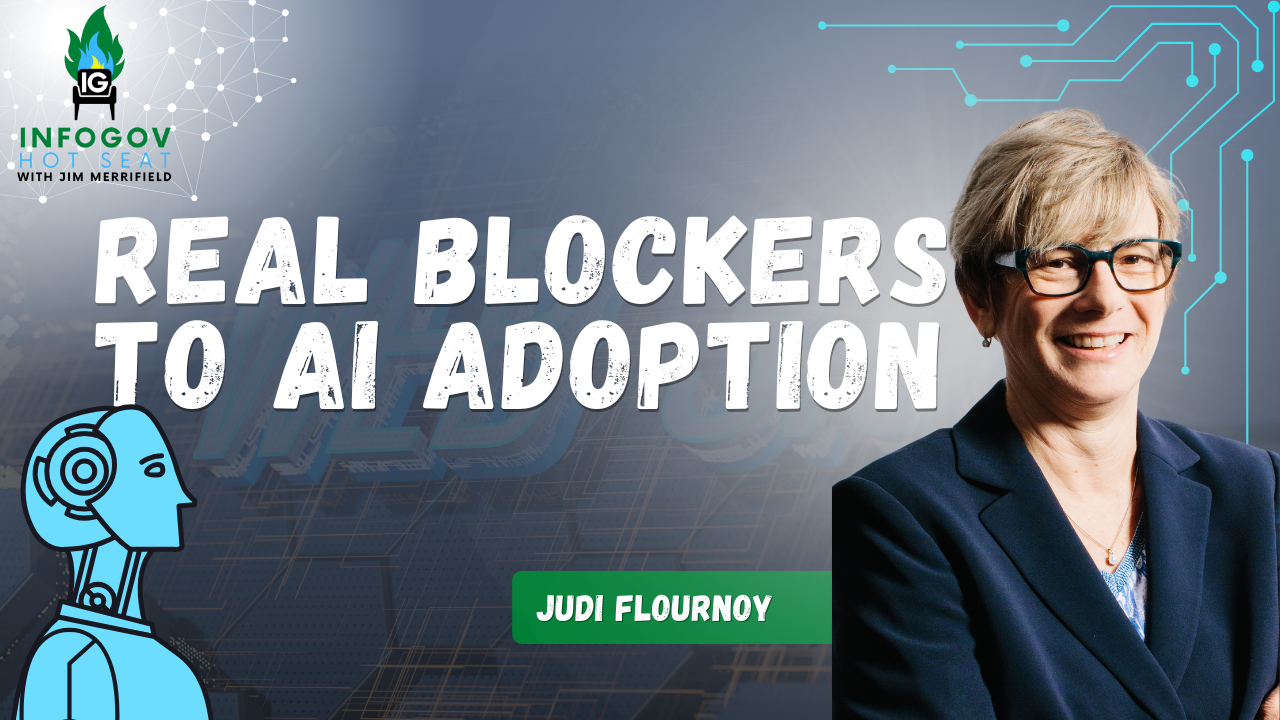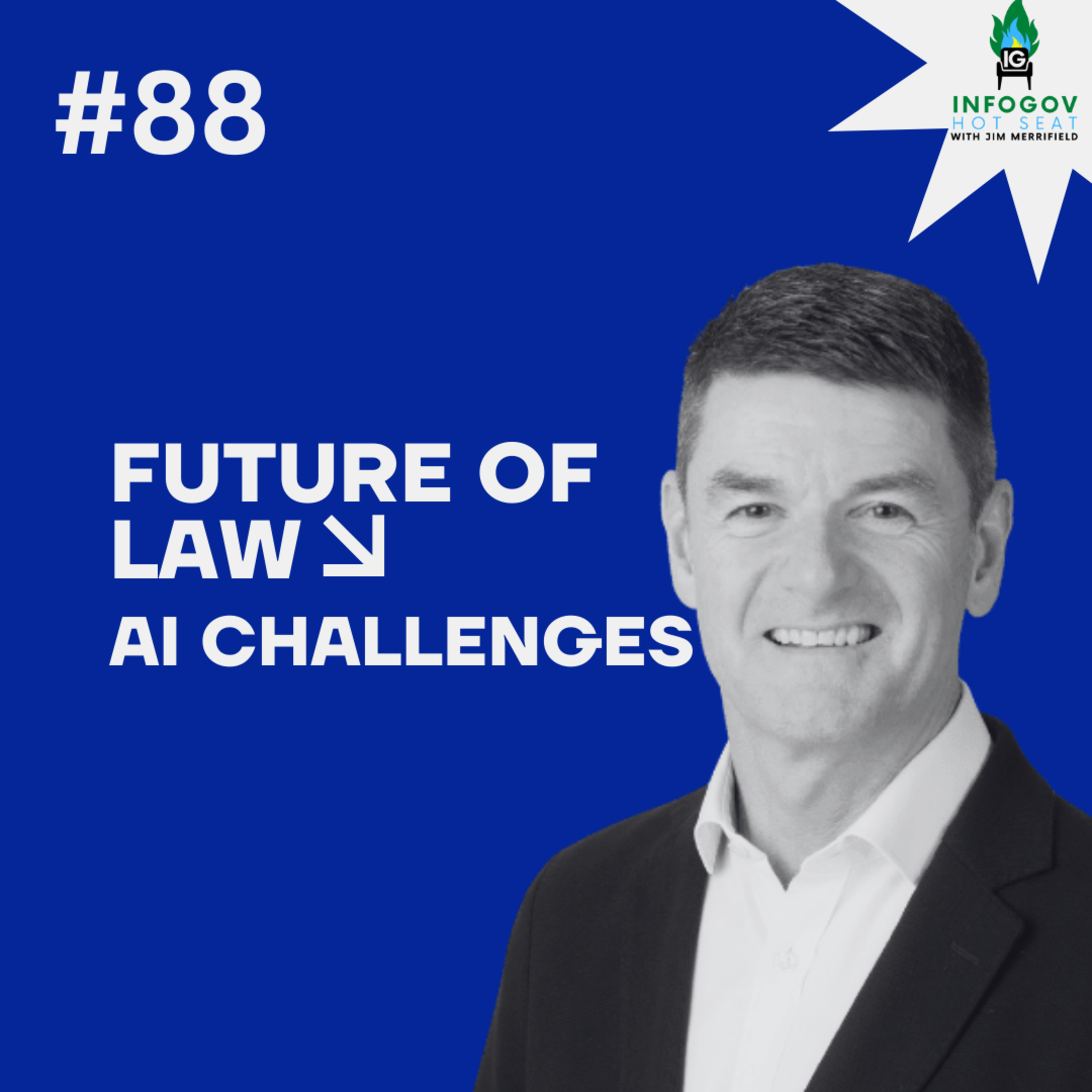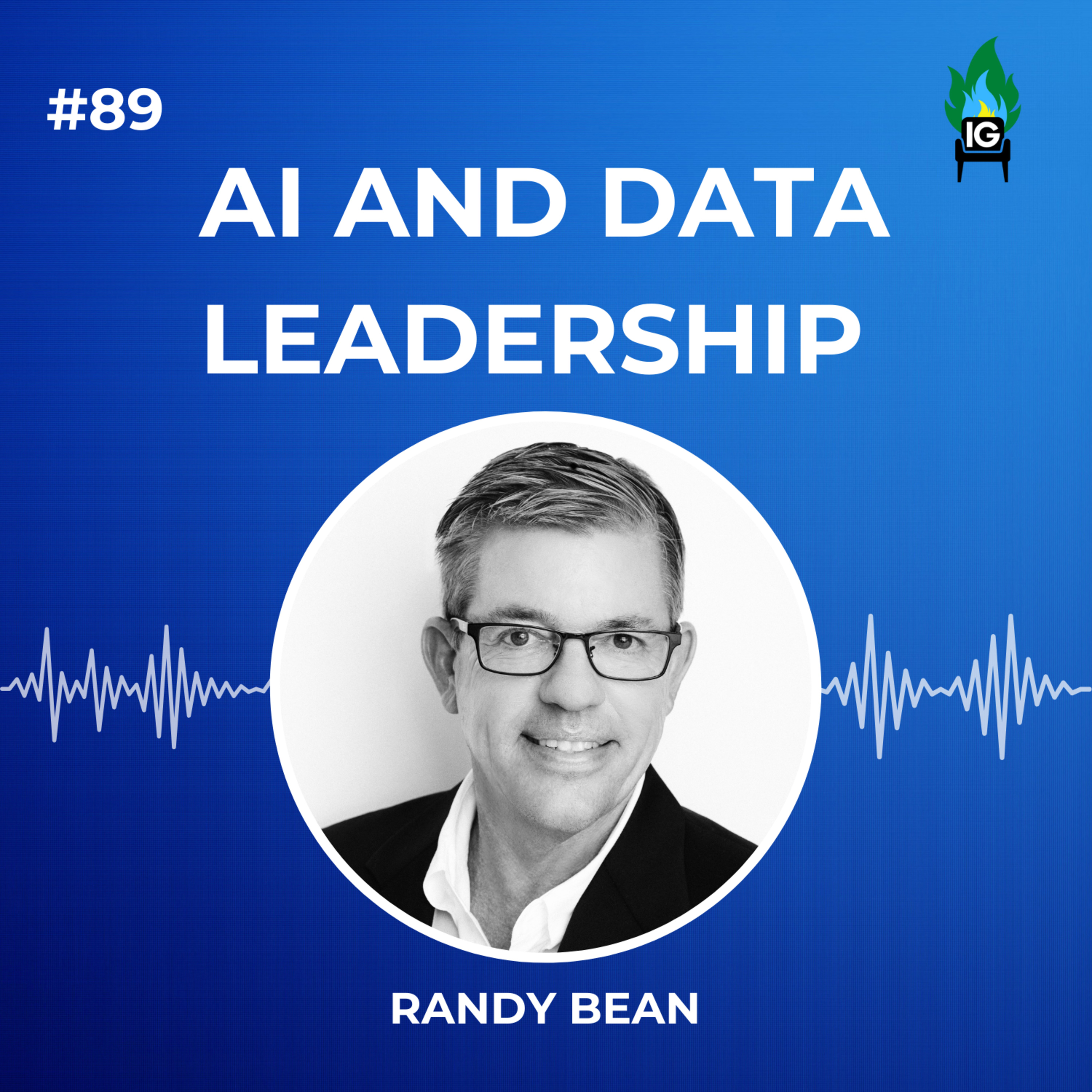IGHS71 - Recap from the ARMA InfoNEXT Conference
In this episode of the InfoGov Hot Seat, host Jim Merrifield is joined by Marina Kaganovich from Google and Jeffrey Sharer from Lexshift. They discuss their experiences at the InfoNext conference, focusing on the impact of Generative AI on information governance. The conversation explores real-world applications of GenAI, the future of AI in the workplace, and the importance of continuous learning in the evolving tech landscape. Both guests emphasize the need for professionals to adapt and leverage new technologies to enhance their careers and deliver better value to clients.
Jim Merrifield (00:00.907)
Well, hello and welcome to the InfoGov Hot Seat! I'm your host Jim Merrifield and with me today are Marina Kaganovich at Google and Jeffrey Sharer at Lexshift. Welcome to you both.
Jeffrey Sharer (00:13.081)
Thank you.
Marina (00:14.232)
Thank you, good to be here.
Jim Merrifield (00:15.819)
Yeah, it's so great to finally get the two of you on the hot seat. So let's start off. Maybe we'll start with Marina. Can you provide a brief introduction of yourself, your current role, and one fun fact about yourself?
Marina (00:31.598)
Sure, thanks. So I'm Marina Kaganovich I am an executive trust lead with Google Cloud. And what that means, as the name suggests, is essentially we're a group of advisors to our strategic customers. part of the office of the CISO at Google Cloud. So we actually roll up into the cybersecurity team. And we provide advisory services to our customers, essentially helping them migrate.
to the cloud and supporting them through their governance and digital transformation initiatives, as well as through various emerging technology changes. And so as I'm sure everyone listening in is aware of the last two years have been really, really exciting from an emerging tech perspective with the emergence of GenAI. And so a lot of the work that we've been doing has been around GenAI, cybersecurity, meaning
not just how you secure GenAI, but also how you can use GenAI for security, as well as supporting the overarching AI governance frameworks that folks are looking to put in place.
Just by way of quick background, prior to joining Google, I have a legal and compliance background, primarily in financial services. So many of the folks that we tend to face off with tend to be from that industry. And yeah, I'm really excited for this conversation. And of course, that legal hat on, have to say the typical disclaimer that the views are my own and don't express those of Google Cloud. So thanks so much for having me.
Jim Merrifield (01:58.261)
You got it. Thanks for joining. Jeff, same questions. Brief introduction yourself, current role, and a fun fact about yourself.
Jeffrey Sharer (02:06.735)
Sure, so for the brief introduction, I'm also a lawyer by training. I still do a bit of work on the just the traditional legal services, the boring billable hour work. I spent most of my career at large firms, started out a litigator before finding my way over to all of these fun areas that pop up where technology meets law, meets lots of information.
And a few years back decided I didn't enough going on that made sense to put it into my own firm, as well as launched Lexshift, which is a technology advisory firm that where we focus on building, largely building legal tech solutions that eliminate some of the things that we were doing previously, very inefficiently on a billable hour model. And so
I wear those two hats. The fun fact that we were talking just before we started up here, I decided to tap into ChatGPT's new tell me about myself feature. They just upgraded the memory and so I wanted to see if there was something fun I could get that maybe ChatGPT knows. And apparently based on all of my...
utilization of ChatGPT over the past couple years now. Here's what it is. Disclaimer, this is what ChatGPT says that I am. I'm a legal tech MacGyver. I'm part lawyer, part engineer, part strategist. I build AI powered solutions for the dusty corners of compliance. I slice through records retention like a sushi chef and I pitch with the
polish of a Madison Avenue ad exec. Equal parts precision and pragmatism and I don't do fluff, just future-proving. Very fun. Yeah, accuracy maybe not so much, but I thought that was a fun take on what would ChatGPT thinks of me anyway after past couple years of getting to know me.
Jim Merrifield (04:32.383)
love it. I think you should use that on your LinkedIn bio.
Marina (04:36.302)
100%.
Jeffrey Sharer (04:36.399)
Yeah well we'll see, maybe a few tweaks.
Jim Merrifield (04:42.999)
Yeah, for sure. Well, thanks for sharing that again. Thank you to you both for being here. I know we spent last week being at InfoNext. The three of us were on a panel. Livin Lovita Loca, unfortunately, know, Ricky Martin couldn't join us, but we talked about the practical pros and cons of large language models in IG. I know our session was only 60 minutes. I think it could have went 90. We had tons of conversation around these topics.
Kind just wanted to continue the conversation here by just asking maybe Jeff first, what was your take around InfoNext? How was your experience before we actually get into the conversation around our panel?
Jeffrey Sharer (05:26.863)
My take on InfoNext, and I've had a similar experience at other conferences over the past maybe 12, 18 months, a lot of fun because it's been a while since we've had something like GenAI that is so disruptive in creating so many new
paths to go down in the sessions, in the conversations, in the hallway, in the networking receptions. Yeah, it seems like the amount and the volume of new and exciting things, most of the people that we talk to have at least some new and exciting things and are having, I think, a lot of fun practicing now with some new tools and figuring out.
how to use them and where's the value. And so both the actual quality of the sessions and the content there, as well as then all of the other activities around the conference, was probably the best InfoNEXT I can think of in at least several years.
Jim Merrifield (06:45.333)
Love it. Love it. Marina, how about you? What was your experience?
Marina (06:50.446)
I'm going to echo Jeff's points. I so this was my first one. So I have nothing to compare it to, but I really enjoyed it. And I realized actually, as Jeff was doing his introduction, that I'm quite bad at following directions apparently, because I forgot to tell you my fun facts. So I apologize for that, Jim. I know you did warn me. Well, I don't know how fun it is, but I was actually reflecting that.
Jim Merrifield (07:07.807)
Okay, I wasn't gonna call you out. was trying to, you leave you alone. But since you asked, what is your fun fact, Marina?
Marina (07:17.538)
I've been doing so much traveling over the last couple of years, especially when the world seemed to open up again following the pandemic. so there was this resurgence of folks getting together and being really excited to be together in person. And I was reflecting on the one hand, the diversity and the variety of the people that I've met. And on the other hand, the absolute singular point of conversation.
irrespective of who you're talking to seems to be GenAI right? Like all roads point back to GenAI. And I kind of found, I love it. And I found it to be the case at Infonext as well. I really enjoyed, I thought that the panels were great. The content was fantastic. I really enjoyed so many of the folks that we met during happy hour, because it was kind of like an informal way of getting together and.
the way the conversation developed like was so organic and it was so interesting to see that interplay because irrespective of specifically what function folks perform, we were always discussing some manner of cybersecurity, privacy, data governance, risk management, information governance, regulatory compliance, how all of those areas interplay, how they all relate together and the...
sole reason we were able to do that was because of this cool new tech called GenAI and that everybody is really excited about in terms of the opportunity, but kind of trying to grapple with as their organizations are going through implementation. so I really like to me, was the one thing that I probably like my favorite thing during the conference, especially telling, I think that we only had what like an hour or so.
budgeted for the discussion and I think I ended up being there like two and a half hours and I could have kept going we were just starting to get kicked out. I think like to me that just speaks to how much interest is generated in this topic and how much more we have to discuss when we meet next time.
Jim Merrifield (09:20.503)
100%. So let's continue. Let's continue this conversation. I know Jeff, we talked about some real world examples on the panel and you mentioned a few real world examples of implementing, know, GenAI and IG and some key lessons from maybe some clients that you've worked with. Do care to collaborate on that a bit?
Jeffrey Sharer (09:45.519)
Sure. So as we were preparing for the session and with this question about real world use cases and thinking through some sort of practical hands on use cases that we could give to the folks who came to listen and potentially give them something that they could.
actually take out of the session, take back and incorporate into their day to day. For me, the use cases fell into sort of two primary buckets, right? One was the bucket of use cases at the enterprise level, at the level of your information governance program. And then the second bucket were the use cases
that are these cases that were more individual in nature, the ways that we can use and leverage GenAI tools as professionals doing our job, serving our clients or our companies or our bosses. And we're seeing tons of both. They're big buckets and they're only going to keep getting bigger.
on the enterprise level, the IG program level, I've been fortunate the past six or eight months to have had a few projects where we have been working with clients on implementing new software solutions that are leveraging
large language models to accelerate and really just turbocharge data classification, information classification efforts. so one of my partners and I have been working with a few clients who are using software that will tie into a ChatGPT or a Gemini, do it with several different models.
Jeffrey Sharer (12:08.039)
and they're using it to, they're running it over the data sources that we all know about that are, they've always been challenging, you know, particularly on the unstructured side, to actually begin getting records into the buckets that track over to retention schedules and other policies internally. And by doing that, it's,
with the clients we've been working with, it's accelerating the mapping exercise that you have to be able to do in order to get ultimately to where we all want to be, which is actually getting rid of the stuff that we don't need. And some of it's been sort of just defensible disposition, rot reduction.
Some of it has been entirely reorganizing departmental file shares before you migrate them over to a new SharePoint environment, for example. And the results that we've seen have been out of this world. We're getting 80 to 90 % accuracy on classifying information. And for those of us who came from any discovery background, if we were getting 60
plus percent accuracy out of the tech assistant review tools, we were ecstatic. So the tools are working well and they're working well and they're delivering actual return on the investment. The other side of it and something that I've had a lot of fun with just in my own practice is taking the opportunities to leverage the AI tools to
scale up essentially to use them as a force multiplier essentially. my law practice is I've got a solo law practice with a partner who is not a lawyer, good sense not to be a lawyer, but subject matter expert on all things IG. And so we've had three or four projects where we've used models and we've actually built out teams. We built teams of
Jeffrey Sharer (14:30.937)
customized models that add roles that we just don't have. So at the beginning of a new project, maybe an industry we don't work with, it takes some work, it takes some time to learn how to use the tools to do this, how to generate the right prompts. But we had a project in an industry we weren't that familiar with. And so we built an AI management consultant with
decades of experience working on all aspects of the business in this area or in this industry. And then as we had questions that came up instead of doing what we normally do, which is not sure what that is, maybe make a note to ask the client, maybe never remember to get back to it. Now I've got it, a voice model on my computer. All I have to do is ask it, hey, what does this mean? And you have to know enough
be able to separate the legit answers from the hallucinations. The hallucinations have been few and far between, but it's enabling us as professionals to deliver two, three, four X to cover two, three, or four X the ground that we otherwise could cover in that same amount of time. so it's...
It's a great feeling. We're delivering more for the clients. We're covering more ground for the same budget, delivering higher quality work product. so I think those would be probably the two most, the two use cases, the two examples we've the most experience with and the great experience on the results side from them over the past several months.
Jim Merrifield (16:26.007)
That's awesome. I love those, you know, those use cases, especially around creating a management consultant, right? It's like having your own like, you know, it on my desk right now, I got, you know, if you're an office fave, right, I got my, little guy, Dwight! I got a little bobblehead here, right? It's like having your own like AI bobblehead, Dwight you know, guy to help you out. You can ask him a bunch of questions and he'll give you some answers, hopefully.
Jeffrey Sharer (16:46.676)
Thank
Yeah, know. Yep, got a handful of bobbleheads behind me. I hadn't thought about deputizing them in the law firm, but maybe that'll be next.
Jim Merrifield (17:00.907)
Yeah, no worries. That's awesome. Thanks for sharing those, Jeff. So, Marina, I know we talked a lot about the future around generative AI and as it relates to the information governance professional. What are your thoughts around that question? What are you thinking?
Marina (17:18.606)
I'm thinking we don't have enough time. There's so many ways of approaching that. I think, you know, the one that comes to mind most is just like the opportunity that it creates from a career development and growth perspective. I think we kind of touched on it when we were together last week, but we didn't really have sort of too much time to expand on the topic. And that's probably the...
Jim Merrifield (17:20.971)
Ha ha ha.
Marina (17:45.91)
sort of main takeaway for me in terms of like, what should we be looking at? Because certainly from a, you know, from a technology perspective, we're going to see, we're going to continue to see enhancements similar to the ones that Jeff described, right? There's going to be better productivity tooling. They're going to be, avatars and agents, right? They're going to be agents that don't just interact with you, but interact with each other.
So there's going to be like much more of an increase in terms of like the interconnectivity and the usage of data that's going to highlight the importance of information governance. But I think from a sort of personal growth perspective, there's this huge opportunity as well to kind of lean into the changes that are happening, right? Because there's certainly some people that are experts, but many, many others, the vast majority of us are not, right? And so there's somewhat of a level playing field in terms of
taking the time to learn now so that we can be better professionals going forward and so that we can continue to be helpful and marketable and know how to use these tools to our benefit. And so I think that, you know, the ability to issue spot, the ability to anticipate risks, the ability to think about like to Jeff's point, like you still need to know enough about the topic for the output that the GenAI provides to you to be helpful and to be able to call out like what you need and what you don't.
And so there's this huge learning aspect that to me is really profound here.
Jim Merrifield (19:14.839)
Yeah, I agree. mean, for whatever reason, I think, well, probably because, you know, information governance professionals, right, that it's focused on extracting value from the data that we manage. now, you know, with generative AI and the whole term AI governance, for whatever reason, information governance professionals are responsible for a lot of the AI governance programs at their organizations. And now is the time, as you mentioned, Marina, to just learn, learn, learn.
and learn as much as you can, right? Because I think IG professionals are at the forefront of this. And I think another topic too that was discussed around the future is how do we, know, anything we do within the organizations, how do we point back to business value, right? How does it help the business generate more revenue, be more efficient, you know, things like that. So.
know, gone are the days of IG being like the police or, you know, compliance stopgap, you know, functions. It's more, you know, forward thinking as you mentioned before, Jeff, and just trying to focus on value around the data in the business. So, go ahead, Jeff.
Jeffrey Sharer (20:33.135)
There's something, just to add to, I Marina was spot on with that. I've talked with lot of people, some of whom are very anxious about what AI is going to do, how much it's going to disrupt, particularly for knowledge workers, how much will it displace jobs.
you know, just as many with optimism for the reasons that we were just touching on, right? AI is, it's so disruptive that that level playing field that we were talking about, it's got very, the barriers to entry right now because everybody's starting from roughly the same place, it creates a massive opportunity. And I think at the end of the day,
AI will displace jobs, but the jobs that won't be displaced will be the jobs for the people who learn how to deliver both the human, what's still a lot of human unique, human specific value, but leveraging these AI tools to turbocharge that. those are the people who are in a position to
you know, to thrive. And, and the at least for the time being the opportunity to the level playing field extends that opportunity to everybody.
Jim Merrifield (22:14.871)
Yeah, no, fair enough. think too, we're probably gonna have to continue this conversation at some point, whether it's on another podcast or maybe another upcoming conference, who knows? I think this group has a lot to talk about in this area, so that's great. But before I let the both of you go, final thoughts, is there anything else you'd like to share with the audience? Marina, maybe we'll start with you.
Marina (22:40.694)
I think I would just say, you know, take, every opportunity you get, like join these conferences, listen to these podcasts, you know, read up on blogs and papers that are coming out on this topic, like really take the opportunity to get educated on it because it's something that is going to be a huge differentiator going forward.
Jim Merrifield (23:00.417)
Jeff, same question.
Jeffrey Sharer (23:00.707)
Yeah. Boy, I wish I had something completely different from what Marina just said, but I think I'm going to, but not surprised because Marina is brilliant.
Jim Merrifield (23:14.359)
Do you wanna put it in Gemini or ChatGPT and say rewrite?
Jeffrey Sharer (23:18.495)
Yeah, really. I'd say the same thing. There's so much information available, easily accessible. Some of it comes from the companies. Google, Marina, how many white papers and tutorials and guidance come out of Google? It's high quality.
It's easily accessible. Any number of apps on your phone, can just set up a feed. I've got a couple of feeds on my phone that just pick up the day-to-day stories. So I follow them and then something catches my eye and I'll go to Google and I'll plug it in and my fingertips will have.
10 resources, anything from YouTube videos and tutorials to white papers and the like. it's easy to get up the curve. It's very valuable to get up the curve. so same thing, I strongly encourage anyone to do it.
Jim Merrifield (24:31.215)
There's tons of information out there. And again, thank you both for sharing your expertise on this podcast, continuing the conversation, taking the time out of your day. For our audience, if you'd like to be a guest on the InfoGov Hot Seat, all you need to do is submit your information through our website, infogovhotseat.com. And thank you so much. Enjoy the rest of your day.
Marina (24:55.33)
Thank you.
Jeffrey Sharer (24:56.227)
Thanks, Jim.
Jim Merrifield (24:57.783)
Got it.
CEO
Veteran lawyer and lifelong technophile, combining decades of legal experience with passion for innovation. Founder and CEO of LexShift and Sharer Law.
Jeffrey Sharer fuses decades of legal expertise with a passion for technology and innovation. As Founder and CEO of lexshift and Sharer Law, Jeffrey leverages a wealth of knowledge gained from nearly two decades as a partner at an elite AmLaw 10 firm, followed by his pivotal role in founding and co-leading the national Data Law Practice Group at another distinguished AmLaw 100 firm.
Through Sharer Law, Jeffrey offers comprehensive counsel on privacy, data protection, and information governance, leveraging his deep-rooted insights at the nexus of law, technology, and data. With LexShift, he pioneers innovative legal service solutions, driving transformation in these domains and guiding clients to follow suit.
Jeffrey earned his JD, with high honors, from the University of Chicago Law School in 1996 and his BA, with high distinction, from the University of Michigan.
Away from the helm of LexShift and the intricacies of data law, Jeff’s ultimate joy comes from being a husband and father. A fervent sports enthusiast and discerning collector, he considers Wrigley Field his “satellite office” and bleeds Maize and Blue for his Michigan Wolverines. An avid concertgoer, his soundtrack is as diverse as his talents, spanning genres from country to metal, yacht rock to rap, and alternative to EDM, with the timeless Jimmy Buffett to rule them all.
Jeff’s affection for sports and music is rivale… Read More

Executive Trust Lead, Office of the CISO, Google Cloud
Marina engages Google Cloud’s financial services customers in the Americas on security topics throughout their cloud journey, focusing on regulatory compliance, risk management, governance and oversight, cybersecurity and privacy.
Prior to joining Google, Marina held Legal and Compliance roles on Wall Street, overseeing the broker dealer compliance program at Thomson Reuters (now Refinitiv), leading US Compliance for the Technology, Human Capital Management and Corporate Services divisions at Goldman Sachs, and most recently, running the Digital Compliance team at BNP Paribas where she specialized in advising on emerging technologies including AI/ML and digital assets, and oversaw programs related to cybersecurity, data privacy, and cloud digital transformation initiatives.









